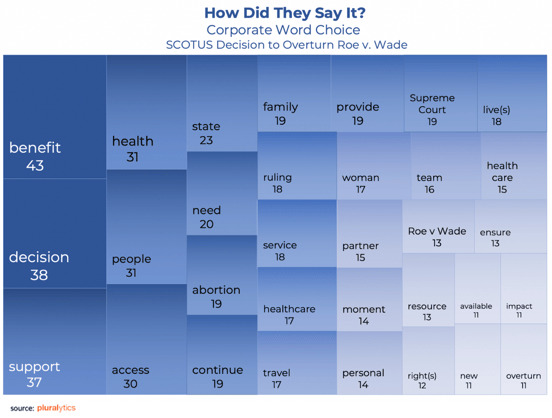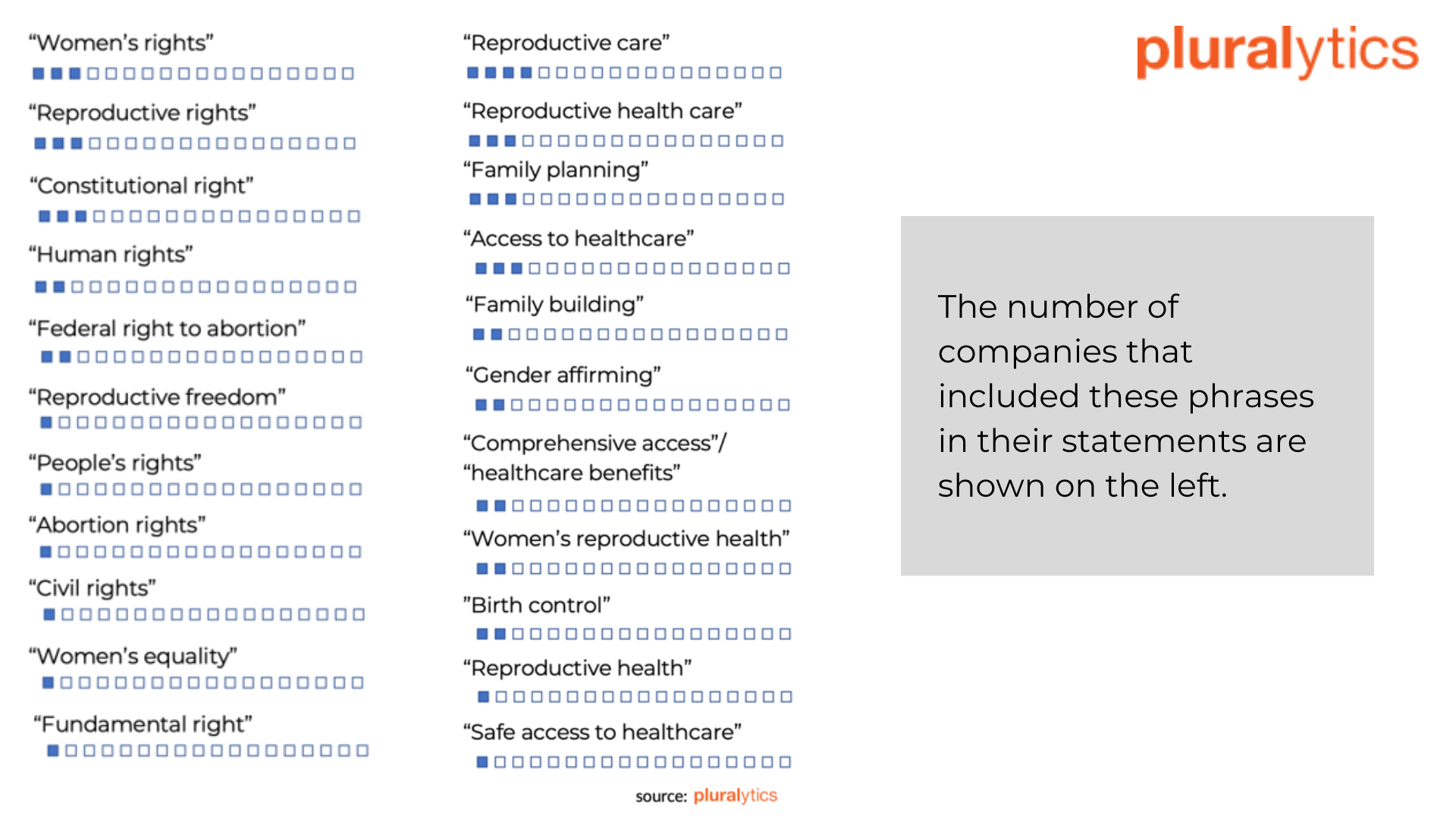The Words We Choose - Roe V. Wade Decision and Employers
An analysis of how large companies communicated to employees about the controversial decision to overturn Roe v. Wade.
Written by the Pluralytics Language Analyst Team

Pluralytics, an AI language intelligence company, has analyzed memos sent to staff from large companies following the recent Supreme Court’s Roe v. Wade decision to reverse the landmark case protecting the right to abortion.
From Google to Starbucks, the 18 memos analyzed were featured in a list compiled by Fortune in “Read the memos that Disney, JPMorgan, Goldman Sachs, and more sent to staff regarding the Supreme Court’s Roe v. Wade decision,” by Paige McGlauflin.
All of the memos described each company’s current healthcare benefits regarding access to abortion services or announced an expansion of benefits to support employees who reside in states that ban abortion.
But the language used, style, and themes represented varied widely.
Some companies released statements within hours of the Supreme Court ruling, such as Dick’s Sporting Goods. Almost all statements evaluated were released within days of the Supreme Court decision, indicating the immediacy and timeliness of response were deemed important for this sample of companies.
The narrative approach taken to write about the decision took different forms. On average, statements were 361 words. The shortest was 175 words by Goldman Sachs, the longest was 739 by PwC. Half of the statements were signed by the CEO, Founder, or the head of Human Resources. One of the most common words used not related to abortion issue was “we”, a frequent use of first person (versus third person), suggesting these statements sought to be inclusive in approach.
Given that readability is often a key goal of employee communication, Pluralytics measured the level of complexity of each statement. The “Most readable” statement, based on Pluralytics’ language density model, was ServiceNow with a score of 9.1 (brief to moderate), and the least readable was Disney, with a high of 18.3 (complex) on a scale of 1-20, brief to complex.
Word Choice
Overall, the most common topic-related words were “benefit(s),” “decision”, “support”, “health”, “people”, and “access” across all the corporate statements to employees.

Number of statements that included “Supreme Court” or “US Supreme Court”

Two companies did not use the phrase “Supreme Court” in their statements. They were JPMorgan and Allbirds.
Number of statements that included “abortion” or “Roe v. Wade”

While “abortion” was mentioned in two-thirds of the corporate statements. One company, JPMorgan had no mention of “Supreme Court”, or the word “abortion”, or the decision, but did announce the expansion of a healthcare benefit to cover all procedures that require travel.
“We will also expand our existing health care travel benefit, which today covers certain services such as organ transplants, to all covered healthcare services that can only be obtained far from your home.”
While PwC, mentioned “Supreme Court” in its memo, but did not use the word “abortion”, and referred to it by using alternative language:
“Through our health insurance, we also offer health care services and related expenses for pregnancy termination.”

Ten out of 18 companies chose to use the phrase “Roe v. Wade” or “Roe v. Wade decision”. Some companies used the phrase “Roe v Wade” and their respective healthcare policies to discuss the topic without saying the word “abortion”, examples include Google and Zoetis.
Number of statements that included “rights” or focused on “access”

No common approach emerged to describe the rights associated with the SCOTUS Decision. “Women’s Rights” and “Reproductive Rights” were the most used.
Paramount Global:
“Across the country, we have entered a moment of profound uncertainty –from a legal and a policy perspective, as states pursue different paths regarding reproductive rights, but also on a personal level, as we try to understand what services will be accessible, when, where and to whom.”
Sephora stated it this way:
“As you have seen, the leak of the Supreme Court draft opinion that would overturn Roe v. Wade threatens women’s lawful and safe access to reproductive healthcare, as well as women’s right to privacy, both of which are essential to women’s equality."
Sephora was the only company to mention the right to privacy.
Others chose to focus on the idea of access, and again this took numerous forms.
For example, Starbucks:
"We all need to process this in our own way, and as you do, here is what I want you to know: no matter where you live, or what you believe, we will always ensure you have access to quality healthcare. And when legislative actions impact your access to healthcare, we will work on ways to make you feel supported."
For example, Google:
“Equity is extraordinarily important to us as a company, and we share concerns about the impact this ruling will have on people’s health, lives and careers. We will keep working to make information on reproductive healthcare accessible across our products and continue our work to protect user privacy.”
Or Zoetis:
“I want to take a moment to express our support for our colleagues and reinforce the comprehensive healthcare benefits we offer. In particular, all of Zoetis’ existing healthcare plans cover a variety of women’s reproductive health services – and that will continue to be the case.”
Two companies, Favor and Conde Nast, called out the idea that “abortion bans” were already in place or were likely to be soon and would affect access in some places.
Coverage Clarity
Half of the companies reaffirmed their current healthcare plans covered procedures that include abortion as well as travel expenses, while the other half announced new policies to cover abortion services travel expenses, expand related coverage or spoke generally that coverage included procedures that required travel due to local unavailability.
Commentary On The Decision

Five companies expressed negative commentary on the decision with language such as “crushing blow” or “significant step backward,” “radical and extreme,” or “shocking”. These included Lime, Conde Nast, Hologic, Allbirds and Esusu.
Lime said: “The decision was outrageous. It is heart-wrenching. And it is wrong.”
And two companies provided resources to take further action or reminded employees of matching for not-for-profit donations by the company.
For example, Esusu:
“In the meantime, if you are looking for more information or feel compelled to take action, we’ve listed some resources below:
-Center for Reproductive Rights
-Planned Parenthood
-National Institute for Reproductive Health
-United States of Women”
Values and Tone of Voice
Pluralytics is the AI-powered language intelligence platform that is powered by values. Its ValuesFinder platform predicts how language is likely to connect with people based on their personal values. The statements reviewed showed appeal to target audiences that value achievement and self-expression. These are people who are driven by success and embrace social justice and index highly for Millennial and GenZ, who are important employee cohorts in the workplace. In addition, the Pluralytics system analyzes for the tone of voice on a per sentence basis to help organizations improve messaging consistency. The statements analyzed revealed a strong presence of the tones: warm, encouraging, and bold. To learn more about Pluralytics, visit www.pluralytics.com.
Methodology
Pluralytics analyzed the statements using its AI-powered language intelligence platform, with natural-language processing to determine word/phrase frequency. The analysis omitted articles and stop words (articles, prepositions, pronouns, conjunctions, etc.). Pluralytics values and tone identification algorithms assessed values appeal and tone of voice of the statements. Pluralytics' readability algorithm scored the complexity of the content and analyzed the word and sentence density of content. The 18 companies’ memos included in the language analysis were: Alaska Airlines, Allbirds, Conde Nast, Dick's Sporting Goods, Disney, Esusu, Favor, Goldman Sachs, Google, Hologic, JPMorgan, Lime, Paramount Global, PwC, Sephora, ServiceNow, Starbucks, Zoetis. None of these companies are current or past Pluralytics customers.
